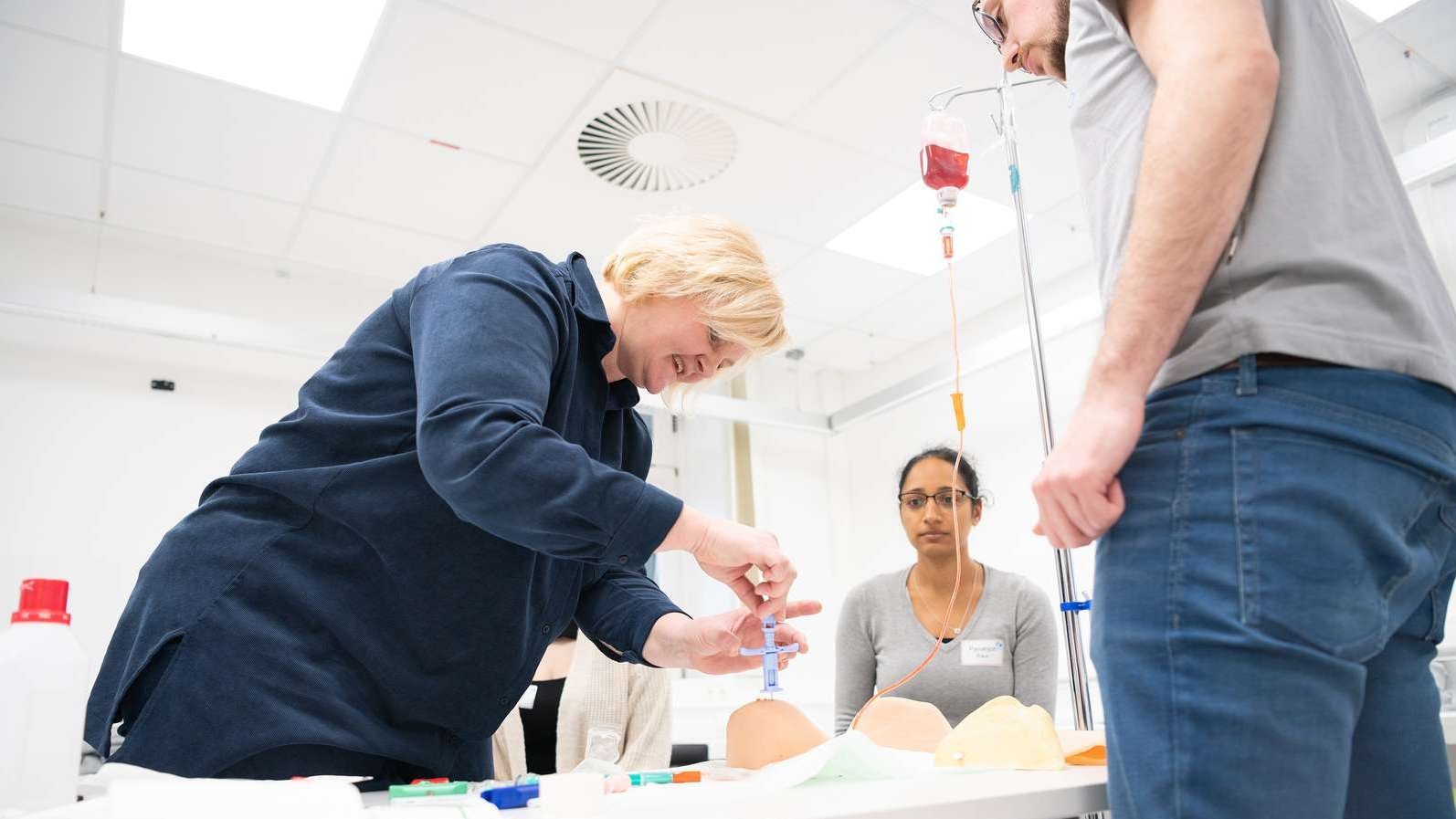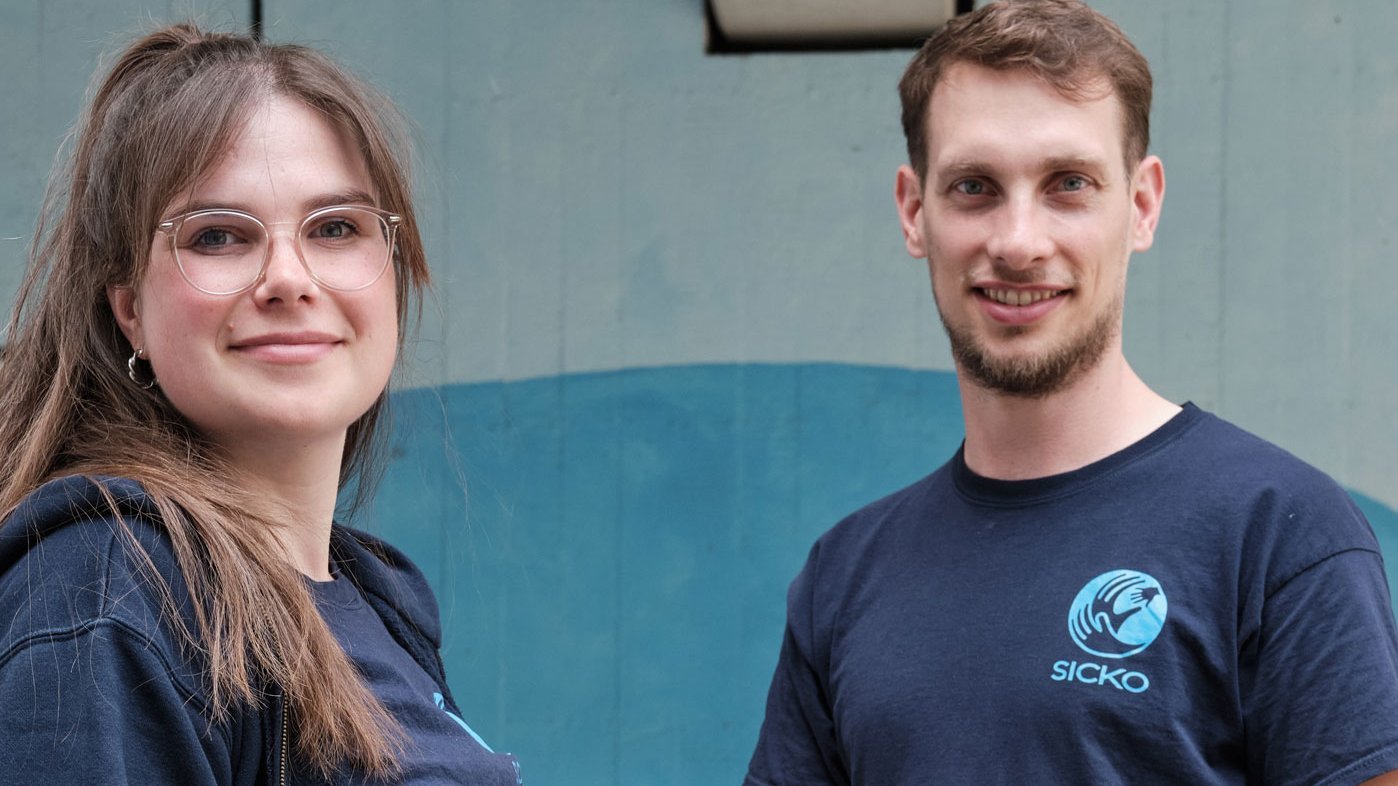SICKO interprofessional team training programme ensures greater safety and higher quality of treatment - award at the Healthcare Industry Congress

Nursing staff practise bone marrow puncture on a simulator to change their perspective Copyright: Anna-Katharina Junge/medJUNGE

Anna-Lena Herbach, Dr. Urs Mücke. Copyright: Bertram Solcher
Great joy at the paediatric clinic of Hannover Medical School (MHH): the project ‘Safety in paediatric oncology (SICKO) - interprofessional training and innovations for greater safety for patients, families and staff’ was awarded the Lohfert Prize 2024 yesterday at the Healthcare Industry Congress in Hamburg. The prize is endowed with 20,000 euros.
In Germany, around 2,200 children and adolescents are diagnosed with cancer every year, which places an enormous burden on the young people affected and their families. On the wards and in the outpatient clinics of paediatric oncology, medical and nursing staff face new challenges every day - both professionally and emotionally. In order to equip staff for their work in paediatric oncology, the physician Professor Dr Lorenz Grigull, the doctor Petra Tiroke and the nurse Birte Sänger founded the SICKO team training course in 2013. In the interdisciplinary SICKO workshops, doctors train together with nursing staff. The project is led by Dr Urs Mücke from the Clinic for Paediatric Haematology and Oncology, and the project coordinator is nurse Anna-Lena Herbach.
Practical skills and communication
‘In addition to practical skills such as handling implanted catheters, performing lumbar and bone marrow punctures and simulating emergency scenarios, we also practise communication techniques,’ explains Dr Mücke. One example of this is closed-loop communication. This method is characterised by mutual reassurance and confirmation and ensures clear action sequences. ‘On the one hand, this increases safety and treatment quality for patients. On the other hand, it also creates certainty of action for each individual team member,’ explains Anna-Lena Herbach. This (self-)confidence is important for working in interdisciplinary teams. It strengthens team spirit and improves job satisfaction. Dr Mücke and Anna-Lena Herbach are keen to bring doctors and nursing staff together at eye level at SICKO. ‘This is the only way to ensure good teamwork in paediatric oncology,’ emphasises Dr Mücke.
Various SICKO formats
SICKO is available in various formats: SICKO classic is a two-day workshop that teaches the basics of paediatric oncology, complication management and teamwork. With SICKO mobile, the team offers the two-day workshop in external clinics with paediatric oncology beds. SICKO junior is aimed at medical students and nursing trainees. More than 580 people from medicine and nursing have already taken part in the workshops. SICKO is financed by the German Paediatric Cancer Foundation.
The Christoph Lohfert Foundation has been honouring projects to improve patient safety and orientation since 2012.This year, innovative ideas and tried-and-tested concepts on the topic of ‘Skills shortage as an impetus. Strategies for developing and strengthening healthcare staff’. A total of 82 applications were received. Commenting on the decision in favour of the SICKO project, Dr Andreas Tecklenburg, spokesperson for the jury, said: ‘We chose this project because it is interdisciplinary and has a very clear patient focus.’ Patient safety is of great importance in paediatric oncology. The special thing about the SICKO workshops is that they were developed by employees for employees.
Making ideas visible
The SICKO team already has concrete plans for the use of the prize money totalling 20,000 euros. ‘We will invest some of the money in workshops to strengthen resilience, particularly in dealing with stress peaks,’ says Dr Mücke. A small internal competition is also to be financed. Interprofessional tandems are to enter the competition with innovations from their own field of work - for example on topics such as patient safety, employee safety and teamwork. ‘In this way, we also want to make our ideas visible to other colleagues,’ explains Dr Mücke.
Text: Tina Götting